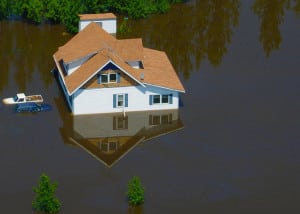Living along the beach in Brunswick County means there could be a possibility of flooding. Most Oceanside homes are built on stilts to protect the property in case of high tide or mild tsunamis but there are ways to prepare for a flood, react to a flood and tips on finding the right flood insurance.
First up, it’s important to know what your homeowners insurance covers. If you purchase your home through financing the bank will want to make sure that the property has the proper insurance. Many homeowners insurance is don’t cover flooding and there may be stipulations and restrictions. The federal government offers a disaster assistance only when the president declares a major disaster for a particular area. Most homeowners insurance policies do not cover flood insurance as a standard coverage. It may cover it if you have a leaky pipe but not an act of God.
Read more: How to Protect Your Home Before, During and After a Flood
Flood insurance usually does not cover everything and may top out at around $250,000. If you want extra coverage for your personal belongings you’ll need to have a specific request for these things. Usually, there’s a 30 day waiting period for coverage so you don’t want to get flood insurance the weekend before a major storm.
Also a good idea to talk to neighbors in a particular area that might be susceptible to flooding. If you’ve lived in the home for decades you probably know the weather strategies, but if you’re new to the area, speaking with neighbors, especially those that have lived in the area for a long time, may be able to answer questions and give you some tips on particular insurance.
Floodplains and maps can change over time and you may not of been in a flood zone initially when you purchase the property but you may be now. Be sure to check with flood smart.gov for maps on flood zoning.
Flood insurance is not always expensive. It may be quite inexpensive based on where you are and the value of your possessions. It can cost as little as $130 a year for $20,000 of rebuilding coverage and $8000 and contents for your main home if you’re in a low risk area. However, high risk areas and the top coverage can cost upwards of $8000 a year in high coastal areas.
Read More: 4 Tips to Buying a Beach House on the North Carolina Shore
One major myth to oceanfront property is the belief that flood insurance programs subsidize beachfront homeowners, which is not true. “Five of the top 12 states with the most number of years in which claims exceeded premiums are in the Midwest from 1978 to 2007. And many of these states hardest hit by floods are nowhere near the beach.” [Source]
To protect your home before a flood hits you want to install backflow valves or standpipes to prevent sewer lines from backing up. Elevate your appliances such as a washer, dryer, furnace, water heaters and electrical wiring on concrete blocks. Install a sump pump system if you have below grade floors (which most oceanfront homes do not have). And finally, consider installing a flood detection device that sounds an alarm if it senses water. These can be placed near the foundation footing of many homes.
Buying and oceanfront home is an exciting undertaking and can be rewarding for many years to come but it is simply wise to plan ahead, understand the risks and make sure that you’re covered for the right amount of replacement.
For more information about buying oceanfront property, homes and land in Brunswick County North Carolina please contact us at any time.
Image by DVIDSHUB Flickr


I like the tip to install backflow valves or standpipes. It’s good to have flood insurance though in case you’re not able to prevent your home from flooding. Does flood insurance only cover a natural flood or can it cover a flooded basement from pipes?
That type of flooding should be covered under your homeowners insurance since it’s not an act of God. Only external flood sources are covered on additional flood insurance.
I didn’t realize that flood insurance could be as cheap as $130 a year! I can see how this is possible since it all depends on where you live and what the possibilities of having a flood are. I would be more comfortable having an insurance like this and not need it than needing it and not having it. I will look more into it and make sure that if I get flood insurance that I get the best. Thank you for the information.
It does depend on it but you’d be surprised at how cheap it can be to add something to your homeowners insurance.
My husband and I bought some beachfront retirement property last month, and we are planning to move in next week. We want to make sure that we take the best care of our home, and we are thinking about getting flood insurance in case there is a hurricane or other natural disaster. Thank you for explaining that we should talk to our new neighbors who have lived in the area for a while to get their advice about flood insurance.